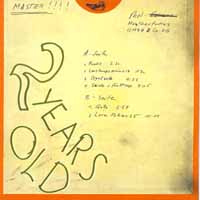
"I’m young, and relatively new to the music-junkie scene, so I never had the opportunity to experience a revolutionary album until it had already been recognized, co-opted, and enshrined in the musical canon. This didn’t bother me in the least: I could still buy, listen to, and enjoy these albums at my leisure, and since they were new to me, I could still be surprised and excited. However, I was missing something as an eternal history student. I was missing the exhilaration that hits when you put on something brand new and
know that it will change everything. You
know the album will affect what you hear for years to come, and you can only guess at the ways its influence will be incorporated. It’s an emotional experience, one of the most exciting for any music listener. Cannibal Ox’s
The Cold Vein hit me in this way.
The first thing every critic wants to do is compare
The Cold Vein to the Wu-Tang Clan’s
Enter the Wu-Tang: 36 Chambers. It’s easy to see why. Both groups hail from New York. Both blend revolutionary (the word ‘innovative’ doesn’t go far enough) lo-fi production with dark, pessimistic rhymes. Both bring their own lexicon to dense flows. And Cannibal Ox’s stunning debut must remind many of Wu-Tang’s similar strike from nowhere. But the most important similarity is each group’s uncompromising originality, a quality that ranges from refreshing to downright stunning.
Not to disparage Can Ox’s gifted MCs Vast Aire and Vordul Megilah, but the production is what really sets
The Cold Vein apart from the pack. El-P (of the influential indie hip hop crew Company Flow) masterminds the entire project with gritty, evocative beats whose lo-fi crackle almost obscures the lush texture of the music. El-P keeps the instrument fragments – pieces of piano melodies and horn licks – of his Company Flow work, but constructs layers of analog synths and fuzzy atmospheric textures around the percussion. The entire album sounds like it was recorded in a basement on a four-track (even the vocals have a metallic echo) creating music that perfectly matches the theme and feeling of the rhymes. And the feelings wrapped up in
The Cold Vein are complex – Vast and Vordul alternate between depression, aggression, and anger. These emotions stem from their surroundings in the bleak ghettos of the Big Apple. “New York is evil at its core” spits Vast on the opener, “Iron Galaxy,” amid burbling synth arpeggios, chiming background textures, and scratchy horn samples.
“Atom” delves further into El-P’s street-side psychedelia, using dirty analog buzzes and aggressive turntable scratching to obscure sonorous horns and guitars. The instruments never fully emerge from the cacophony, but nevertheless shine through hopefully, much like Can Ox’s tortured MCs.
“B-Boy Alpha” is a storming tour-de-force, hurling synth squelches and electric guitar solos against haunting piano twinkling (a nod to RZA perhaps). Vast and Vordul storm the mic, constructing elaborate rhymes around how they escaped the violence of the streets through their music. This contrasts sharply with the next track, the sparse, spacey “Raspberry Fields,” which features stuttering drum kicks and synths that whine like tiny dive-bombing planes.
Vast easily tackles the album’s centerpiece, “The F-Word.” It’s an unrequited love song, a definite rarity in street hip hop, but Vast pulls it off with deft wordplay. “She was in a love triangle / But it’s not like my feelings weren’t there / To make it a square,” he recalls. The ‘f’ in “f-word” stands for “friend”: Vast holds the much-maligned position of “just-friend” with the object of his affection. Later, he laments “I was supposed to be the friend / But I’m getting fried in the end.” This couplet sees Cannibal Ox’s poetry at its most complex – combining the words ‘fried’ and ‘end’ make the word ‘friend.’ Moments like these show not only the skill of Can Ox’s MCs, but the potential for hip hop lyrics to work on as many levels as the finest English poetry.
If
The Cold Vein has one weakness, it is in its length: at 75 minutes, it can be exhausting. However, more often than not, it’s simply enthralling, and an epic like this calls for not one, but two album closers. First, “Pigeon,” an uncompromising piece of ghetto-verite, assisted by El-P’s epic production. The flows roll by effortlessly, detailing the ghetto almost cinematically. Vordul comes in with a particularly disturbing verse: “Cats who pop flows shot heavy through the nostril / Brain sizzle grab the pistol and get hostile / He caught you alone fuse blown / Unemployed screaming ‘That's why I robbed you!’” However, the album’s bonus track provides a needed epilogue to
The Cold Vein’s intensity. Vordul and Vast construct another atypical lyrical stew, involving the metaphor of the pigeon as the disenchanted ghetto-dweller from the previous track. Against the refrain of “Scream phoenix,” they extort their fellow pigeons to elevate themselves through art. The goal never comes across as preachy – merely helpful advice from a couple of “street peasants” who managed not only to advance themselves, but advance music in the process."
One of the best Hip-Hop albums ever, bar none. Probably the finest Hip-Hop production job ever. It's really hard to talk about an album that pretty much redefines what "rap" is capable of doing. Those are some creepy fucking beats! Jesus. If you haven't had the pleasure/horror, than by all means. Grabs its.
Ox out the cage




















